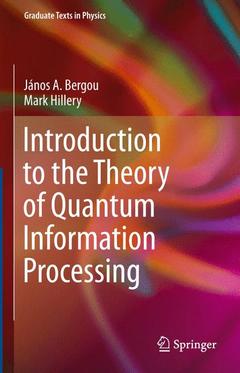Description
Introduction to the Theory of Quantum Information Processing, 2013
Graduate Texts in Physics Series
Authors: Bergou János A., Hillery Mark
Language: English
Subject for Introduction to the Theory of Quantum Information Processing:
64.07 €
In Print (Delivery period: 15 days).
Add to cartSupport: Print on demand
Description
/li>Contents
/li>Biography
/li>Comment
/li>
Introduction to the Theory of Quantum Information Processing provides the material for a one-semester graduate level course on quantum information theory and quantum computing for students who have had a one-year graduate course in quantum mechanics. Many standard subjects are treated, such as density matrices, entanglement, quantum maps, quantum cryptography, and quantum codes. Also included are discussions of quantum machines and quantum walks. In addition, the book provides detailed treatments of several underlying fundamental principles of quantum theory, such as quantum measurements, the no-cloning and no-signaling theorems, and their consequences. Problems of various levels of difficulty supplement the text, with the most challenging problems bringing the reader to the forefront of active research.
This book provides a compact introduction to the fascinating and rapidly evolving interdisciplinary field of quantum information theory, and it prepares the reader for doing active research in this area.
Preface.- Introduction.- The Density Matrix.- Entanglement.- Generalized Quantum Dynamics.- Quantum Measurement Theory.- Quantum Cryptography.- Quantum Algorithms.- Quantum Machines.- Decoherence and Quantum Error Correction.- Index.
János Bergou is a Professor at Hunter College and the Graduate Center of the City University of New York. He received his Diploma (MS) and Ph.D. from the Eötvös University in Budapest, and a Doctor of Science degree from the Hungarian Academy of Sciences, all in physics. He started his career at the Central Research Institute for Physics in Budapest, Hungary. He was a Humboldt Fellow at the Max Planck Institute for Quantum Optics in Garching bei München, Germany, and a visiting professor at the Institute for Modern Optics at the University of New Mexico before settling in New York. He is a fellow of both the Optical Society of America and the American Physical Society. He served as Divisional Associate Editor for Physical Review Letters and is currently a Member of the Editorial Board of Physical Review A. He has worked primarily in the areas of quantum optics and quantum information.
Mark Hillery is a Professor at Hunter College and the Graduate Center of the City University of New York. He received a BS degree from MIT and a Ph.D. from the University of California at Berkeley, both in physics. He did postdoctoral work at the Institute for Modern Optics at the University of New Mexico and at the Max Planck Institute for Quantum Optics in Garching bei München, Germany. He is a fellow of both the Optical Society of America and the American Physical Society and an Associate Editor of Physical Review A. He has worked primarily in the areas of quantum optics and quantum information.




